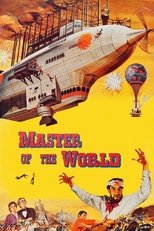Wuchak
Oct 7, 2024
4/10
Ranks with the least of the classic Jules Verne flicks
In 1868, a scientist and his team are exploring a volcanic crater in the Appalachians when their hot air ballon is shot down and they become “guests” on an amazing airship, part zeppelin and part helicopter. The captain of the vessel (Vincent Price) is at war with war and intends to obtain peace on Earth by destroying military targets.
“Master of the World” (1961) was based on two books by Verne, Robur the Conqueror from 1886 and its sequel from 1904, the latter of which shares the name of this film. The character of Robur is basically Captain Nemo in the skies, but Disney’s “20,000 Leagues Under the Sea” had ten times the budget while the contemporaneous “Mysterious Island” had twice the budget. Except for the model used for the airship, the special effects are dubious and so are the sets, costumes and score.
The writing is on the wall in the opening scene, after an entertaining prologue featuring historical attempts at functioning aircraft: The mountains in the background of the fictional town in Pennsylvania look fake and nothing like the Appalachians, particular the volcano. Then Price’s voice is heard via an early loudspeaker, which is just as cringeworthy.
Vincent is his usual entertaining self and it’s interesting to see Charles Bronson when he was so young (38 during shooting). Speaking of which, Price was known to make friends with his costars, but he said it was impossible to do so with Bronson. On the feminine side of things, there’s winsome Mary Webster.
A similar film is “Captain Nemo and the Underwater City” from seven years later. It had a slightly bigger budget (yet not that much bigger, considering inflation) and takes the same basic concepts for an all-around superior viewing experience, very colorful and awe-inspiring. It just exchanges Robur with Nemo, the skies with the depths of the ocean, and the airship with a magnificent underwater city. On top of all this, it has Luciana Paluzzi and Nanette Newman.
The movie runs 1 hour, 42 minutes, with location work (outside the studio sets) shot in Alabama Hills, Lone Pine, in east-central California. Archival footage from “The Four Feathers” (1939) was extensively used.
GRADE: C-
